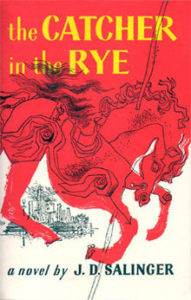“Who Am I?” focused on some of the the country’s most beloved coming-of-age stories—books like To Kill a Mockingbird, A Tree Grows in Brooklyn, and The Catcher in the Rye, which have helped countless readers to understand their own identities and find their place in the world—and featured a host of fascinating interviews with Lauren Graham, John Green, S.E. Hinton, John Irving, Yahdon Israel, Devon Kennard, Diane Lane, George Lopez, Lisa Lucas, Armistead Maupin, Jason Reynolds, Joshua Rothman, Parul Seghal, Kevin Young, and others.
As we’ll be doing the day after each week’s themed episode from now until the grand finale on October 23, we looked back through our Classic Reviews Archive to bring you what the critics said about some of these now-iconic books.

A Tree Grows in Brooklyn, Betty Smith
The world was hers for the reading.
*

The Catcher in the Rye, J. D. Salinger
What really knocks me out is a book
that, when you’re all done reading it, you wish the author that wrote it
was a terrific friend of yours and you could call him up on the phone
whenever you felt like it. That doesn’t happen much, though.
“Mr. Salinger’s brilliant, funny, meaningful novel is written in the
first person. Holden Caulfield is made to tell his own story, in his own
strange idiom. Holden is not a normal boy. He is hypersensitive and
hyper-imaginative (perhaps these are synonymous). He is double-minded.
He is inexorably self-critical; at various times, he refers to himself
as yellow, as a terrible liar, a madman, a moron.…
“The literalness and innocence of Holden’s point of view in the face of the tremendously complicated and often depraved facts of life make for the humor of this novel: serious haggles with belligerent taxi-drivers; abortive conversational attempts with a laconic prostitute in a hurry; an ‘intellectual’ discussion with a pompous and phony intellectual only a few years older than himself; an expedition with Sally Hayes, which is one of the funniest expeditions, surely, in the history of juvenilia. Holden’s contacts with the outside world are generally extremely funny. It is his self-communings that are tragic and touching—a dark whirlpool churning fiercely below the unflagging hilarity of his surface activities.”
Keine Kommentare:
Kommentar veröffentlichen